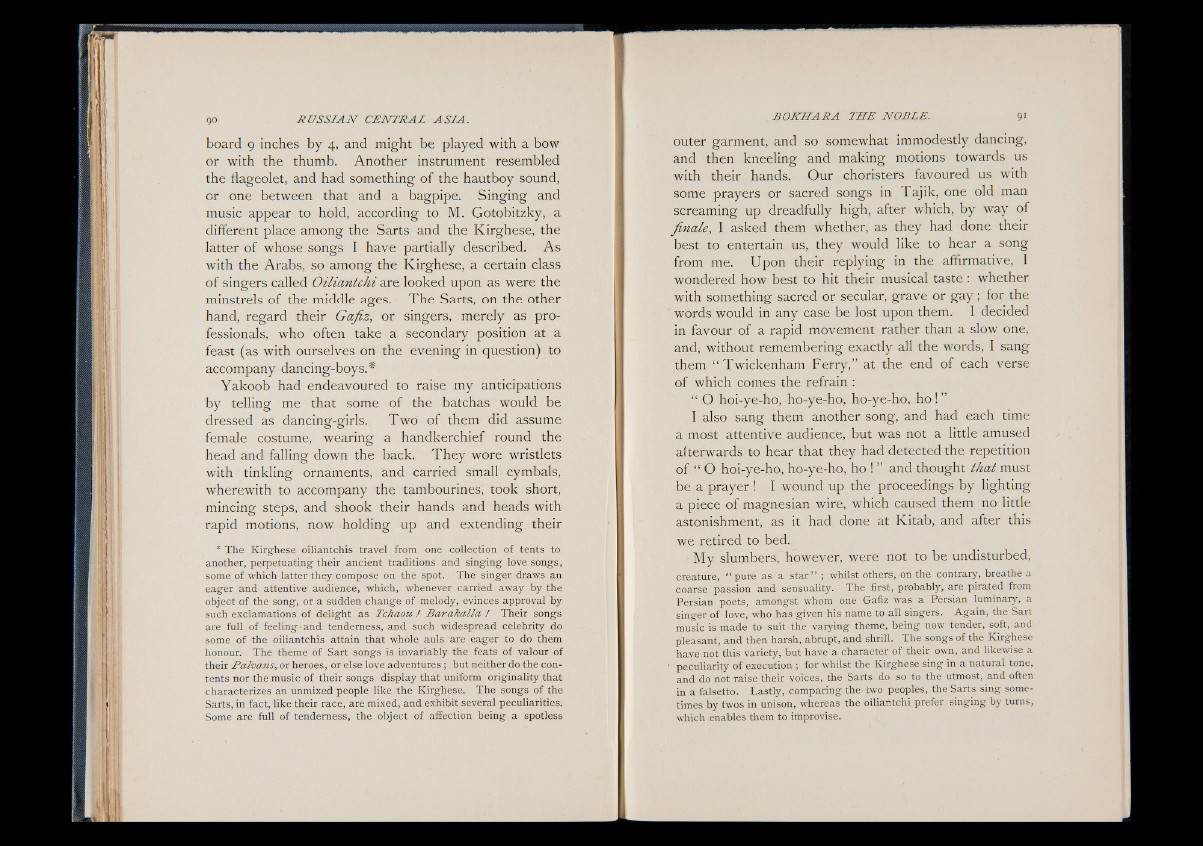
board 9 inches by 4, and might be played with a bow
or with the thumb. Another instrument resembled
the flageolet, and had something of the hautboy sound,
or one between that and a bagpipe. Singing and
music appear to hold, according to M. Gotobitzky, a
different place among the Sarts and the Kirghese, the
latter of whose songs I have partially described. As
with the Arabs, so among the Kirghese, a certain class
o f singers called Oiliantchi are looked upon as were the
minstrels of the middle ages. The Sarts, on the other
hand, regard their Gajiz, or singers, merely as professionals,
who often take a secondary position at a
feast (as with ourselves on the evening in question) to
accompany dancing-boys.*
Yakoob had endeavoured to raise my anticipations
by telling me that some of the batchas would be
dressed as dancing-girls. Two of them did assume
female costume, wearing a handkerchief round the
head and falling down the back. T h e y wore wristlets
with tinkling ornaments, and carried small cymbals,
wherewith to accompany the tambourines, took short,
mincing steps, and shook their hands and heads with
rapid motions, now holding up and extending their
* The Kirghese oiliantchis travel from one collection of tents to
another, perpetuating their ancient traditions and singing love songs,
some of which latter they compose on the spot. The singer draws g.n
eager and attentive audience, which, whenever carried away by the
object of the song, or a sudden change of melody, evinces approval by
such exclamations of delight as I'chaou / Barakalla / Their songs
are full of feeling and tenderness, and such widespread celebrity do
some of the oiliantchis attain that whole auls are eager to do them
honour. The theme of Sart songs is invariably the feats of valour of
their Palvans, or heroes, or else love adventures ; but neither do the contents
nor the music of their songs display that uniform originality that
characterizes an unmixed people like the Kirghese. The songs of the
Sarts, in fact, like their race, are mixed, and exhibit several peculiarities.
Some are full of tenderness, the object of affection being a spotless
outer garment, and so somewhat immodestly dancing,
and then kneeling and making motions towards us
with their hands. Our choristers favoured us with
some prayers or sacred songs in Tajik, one old man
screaming up dreadfully high, after which, by way of
fin a le, I asked them whether, as they had done their
best to entertain us, they would like to hear a song
from me. Upon their replying in the affirmative, I
wondered how best to hit their musical taste : whether
with something sacred or secular, grave or g a y ; for the
words would in any case be lost upon them. I decided
in favour of a rapid movement rather than a slow one,
and, without remembering exactly all the words, I sang
them “ Twickenham Ferry,” at the end of each verse
of which comes thfe refrain :
“ O hoi-ye-ho, ho-ye-ho, ho-ye-ho, ho ! ”
I also sang them another song, and had each time
a most attentive audience, but was not a little amused
afterwards to hear that they had detected the repetition
of “ O hoi-ye-ho, ho-ye-ho, ho ! ” and thought that must
be a prayer ! I wound up the proceedings by lighting
a piece of magnesian wire, which caused them no little
astonishment, as it had done at Kitab, and after this
we retired to bed.
■My slumbers'"however, were not to be undisturbed,
creature, “ pure as a star” ; whilst others, on the contrary, breathe a
coarse passion and sensuality. The first, probably, are pirated from
Persian poets, amongst whom one Gafiz was a Persian luminary, a
singer of love, who has given his name to all singers. Again, the Sart
music is made to suit the varying theme, being now tender, soft, and
pleasant, and then harsh, abrupt, and shrill. The songs of the Kirghese
have not this variety, but have a character of their own, and likewise a
peculiarity of execution ; for whilst the Kirghese sing in a natural tone,
and do not raise their voices, the Sarts do so to the utmost, and often
in a falsetto. Lastly, comparing the two peoples, the Sarts sing sometimes
by twos in unison, whereas the oiliantchi prefer singing by turns,
which enables them to improvise.